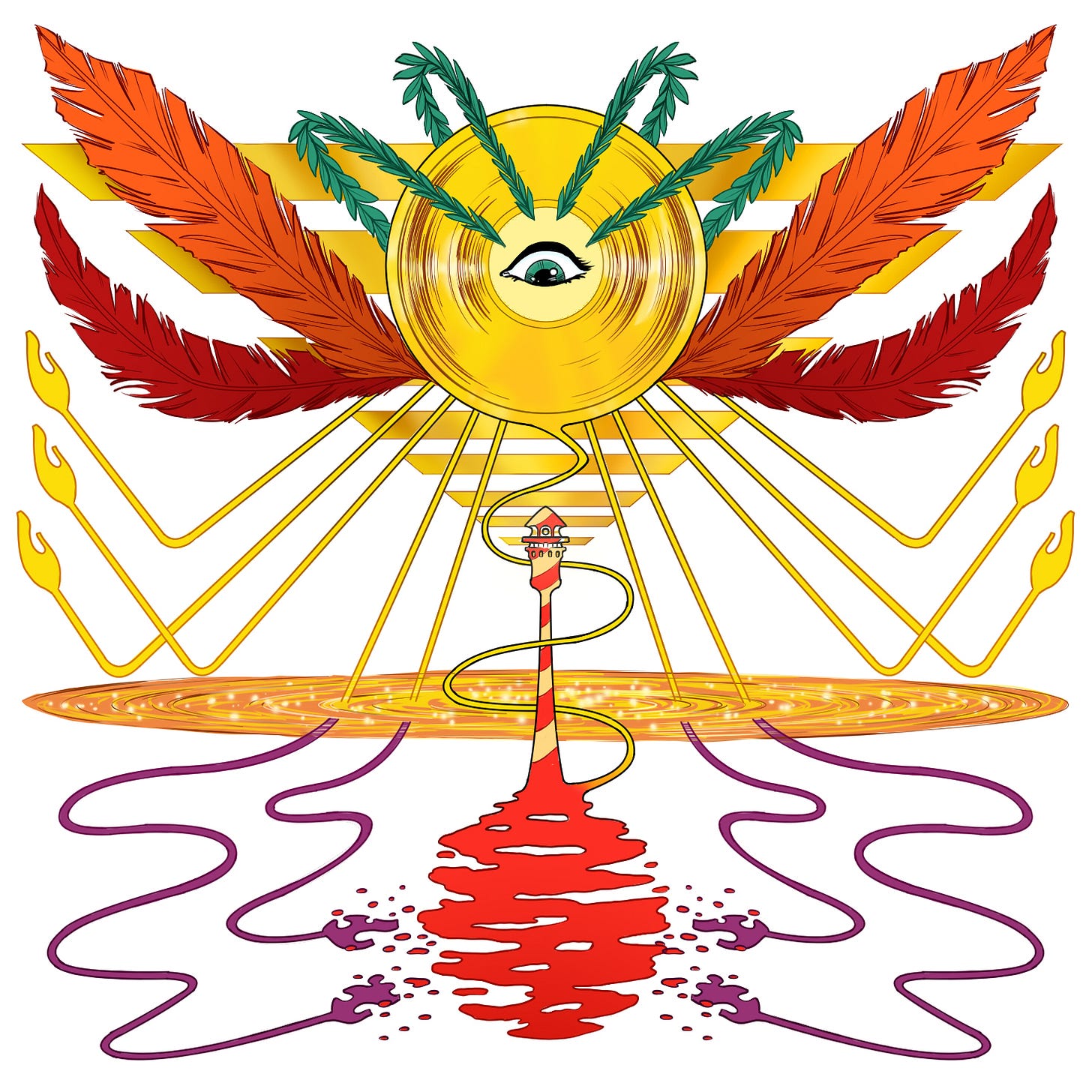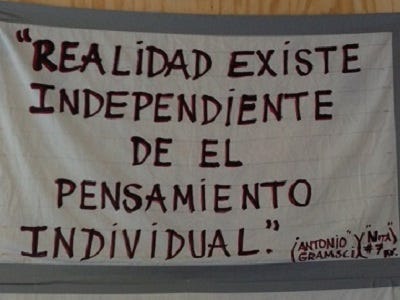What's Behind the Words
The Golden
Power
earthly compressed heat pushes upward and outward volcanic brew dandelion and redwood partake of the same quickening continental cycles, blowball seed dispersal dank fertile rot on fallen giants
Desire gropes in secret recesses, interior seepage of subterranean inquiry, never certain it’s ready to bear knowing itself — as power, as power-seeking. Thus wriggles the core question of power, the truth of power: its inescapability.
Resistance to power wields power. Every thought and every act enact our own. Any efficacy of “truth-to-power” speech depends upon the power of words.
Life choices, life paths devolve upon the question of power: through purpose, one finds one’s true power. One discovers one’s right. But what is true power? And how is it distinct from might-as-right?
Worldly power traumatizes, tread of the police boot, but good works last, their quality effulgent as “self-evidence” of the reality of human worth. How do the works of humans attain — and retain — their power? How do works last? How do words last?
If within a language the vocabulary is common, how can it be that in use, some words soar and some thud to the ground? A lexicon isn’t differentiated by powers, although each word can have its own character and quality. (If I ask about the power of words, I am staying close to what is toyed with by the term Word Magick.)
Last entry, I mentioned Voice itself (charged with the character of the writer)
For the reader, What’s behind the words? An Other
an actual Other
The Other is real, the Other is other and non-mechanical, non-algorithmically predictive (however unpredictable to humans the algorithmic predicate might be); to discern the other is a predicament, due to our own mental and technological mirrors, projected from our imaginative reaching: do we reach outwards and otherwards, or are we othering — personifying — our own fantasies?
The fact that there is an Other, the fact that there are others — as much as “hell is other people,” “hell is yourself,” and “hell is empty and all the devils are here” — these facts of alterity offer solace against solipsism.
For self-realization, it’s a desideratum to recognize the other not as an object, but as a reciprocal being — Martin Buber’s I-Thou over I-It — for only then can one enter into living relationship, and only through living relationship can the boundless be touched. Solipsism presents itself as solace to the pains of a self pressed against its bounds, the hurt whereby limits frustrate its universal sense of being; it tries for an undue, delusional expansiveness. The other is counterpart to self, instructive of universal limitation, specificity, individuation, the particular as inseparable with the whole. Not in the other does one have oneself, but only in the other can one grasp what a self is, in being; one cannot grasp oneself, but one can grasp what is distinguished apart from oneself, the presence of what’s apart — even as one can never fully grasp the whole. One can begin to enter relationship.
The I is constitutionally hyphenated (as in I-Thou, I-It), even if at times, crucially, the I must stand alone; that stance understands itself best in its inseparability from the world, the melting of distinct counterparts. In solipsism, the self can’t be: rather the self cannot know itself, because solipsism isn’t a state of being, but a state of misunderstanding of self — one that careens with the grave danger of psychopathy, imposing one’s will upon the world without regard for others, without recognition of the other. The damage done is real, potentially earth-shattering. Still, mortality — alterity — the impositions of existence beyond their understanding inevitably crush such criminals.
From Buber to Emmanuel Levinas, to understand the Other as radical counterpart to Self extends into discourse. Beyond real-time encounter; cross-times and cross-space, alterity is the domain of literature, philosophy, and thinking. In Otherwise Than Being (translated by Alphonso Lingis1), Levinas points to a distinction between the Saying and the Said. In such a determination, there is room to find what is behind the words. It’s possible in the Saying to coruscate, to attain poetry. In the Said, there is definitive lingering of the Other; that is, there is the Other, lingering. Behind the words are the Other and the Said, and the words themselves: Saying, utterance.
Each and every other challenges an embrace (distinct from use, underestimation, and menace): animals, plants, fungi — AI, if it ever can become discernibly other (beyond delusion, beyond warped hollow reflection of an endlessly human-mirroring abyss) — and whatever fields of consciousness reside in the universe at every order of magnitude, at every exponential power of its scales, from subatomic particles to galaxies — & beyond. The object is leaden. The radiance of being is golden.
Without the Other, there is no Love, only a delusional masturbatory solipsism lost in its own labyrinth of mirrors and projections. Without the Other, there is no Self, no wholeness.
Without the Other, there is no context. (Without context, the text is left in the like untenable irreality as the Self in solipsism.)
Jorge Luis Borges demonstrates this in his story, “Pierre Menard, Author of the Quixote.” Borges, through his fictional Menard, implicates context and the intent of the author absolutely into readings of the “created” text. Menard has to reach — through himself — the passages he writes of Miguel de Cervantes’ Don Quixote; the attainment as a writer, as a creator, is to the words themselves as something truly of himself — Menard, not Cervantes. Only so, as Borges conceives it (according to Menard and Borges’ narrator), will the words as they were in Cervantes be of worth when coming from Menard. These multiple layers of mental construction belie the simplicity of what’s insinuated here: the power of the words aren’t in the words themselves merely repeated, word-for-word, but in what propels their utterance. Menard has to achieve some type of being that would thoroughly motivate the words. Such was the strange goal imagined by Borges, worthy of and indicative of highest aims of artistic process: a “solitary game” — towards forcible, limpid resonance, Saying.
Relevant to process, Borges illuminates how the memory of a work can be akin to rudiments of a creative vision: Menard works only from the memory of having read Don Quixote in childhood, and it’s noted his impressions “equal the imprecise and prior image of a book not yet written.” Borges’ narrator can see the personal Menard himself, as well as interconnections with his listed oeuvre, in Menard’s Quixote — the author behind the words. Here Interpretation ineluctably reads into authorhood and authority from the Said, this — “verbally identical, but richer” — text, implicit with context of the writer’s time and place, his predecessors, his situation in literary history. So different from Cervantes’ burlesque, Menard’s work is a historical novel reconceived at the roots, Modernist with precursory Postmodern impulses. Conclusion of Menard: “Every man should be capable of all ideas and I understand that in the future this will be the case.” Conclusion of Borges’ narrator: a new Art of Reading is possible through “deliberate anachronism” and “erroneous attribution” — reading as if the writing were of another time and by another person. Astonishment awaits!
Shakespeare’s monkeys write meaningless words even if they type his complete works, and perhaps it doesn’t matter at this point if Shakespeare is William Shakespeare or Francis Bacon or Edward de Vere, but it does matter if Shakespeare’s a monkey.
Deep Assignment, Deep Paradox
Sincerity, truth: a human being stands by their word
The Chinese Written Character as a Medium for Poetry by Ernest Fenollosa, edited by Ezra Pound
What is demanded of the writing and the writer, of the Saying and the Sayer, spirit of the letter, form and its shadow, dark energy, dark matter, the intervals, the in-between, coruscating light, the shimmering.
to stand by, to face, one's words one's words on the tongue, a flame an unwavering flame mouth a sun, its emanations radiant rays golden and far-reaching
Upon what the written character contains, Fenollosa/Pound have Confucius saying, “A person’s character is apparent in every brushstroke.” Just so, the written word, the spoken word.
R.I.P Alice Notley. As a reader (and talker), I have a weakness for enthusiasm, and praise, when praise can be intrusive, not respectful enough of the way-it-isness of what’s there: forgive me, yes she was — Is! — dazzling in arising, arresting truth and presence. Fierce and magnificent. But I’ll get back to the way it is of what can be said, and what’s behind it. Valor. Every now and then one poet gets there, while many never do. Notley gets there over and over again, and remains.
Here she is in Certain Magical Acts
"I couldn't sleep in my dream" ... Here are the words you were looking for. But I wanted something different—Or is this it? Any- thing, anything's different. ...But I've always been a poet, that's all, no sex or race, no age or face. Can Eternity strip me of it? That's only another word. I'm inside myself, and inside it. Today's the new fact. Are there others there? Timeless, and loveless, this light touches me. I won't need anything else. IF THE REAL IS SO REAL WHY ISN'T IT ... Can I talk to you as if I didn't know how? I have this...this grail.
As ever as well, as since the beginning of Poetry, Thought, Word Magick, I cleave to Martin Buber’s essential claim (and so have repeated it here a number of times):
“Nothing remains but what rises above the abyss of today’s monstrous problems, as above every abyss of every time: the wing-beat of the spirit and the creative word.”
The old world is dying, and the new world struggles to be born; now is the time of monsters.
— Antonio Gramsci

Two people mentioned in this post died this month. Alice Notley last week, on the 19th. Alphonso Lingis, on the 8th. Notley is glimpsed above. Lingis himself could’ve been a Borgesian creation, with his name, with the varied and revealing titles of his bibliography, and with his home life in Baltimore amidst exotic travelogue artifacts and his aviary.








